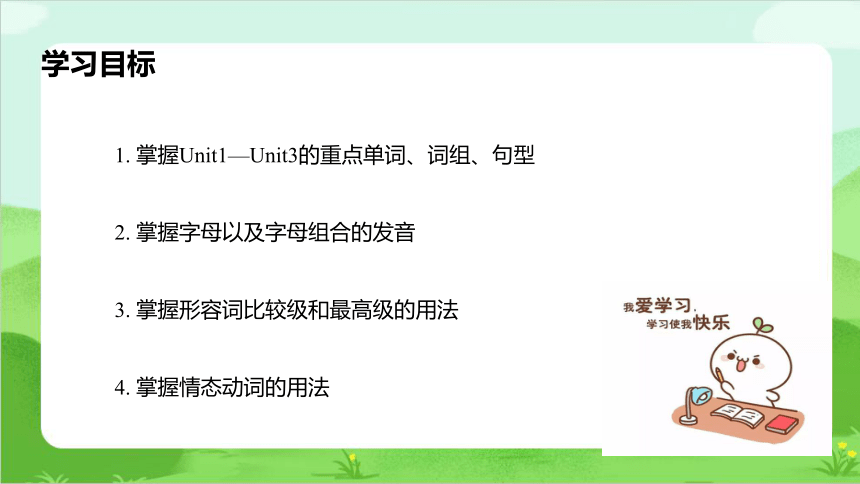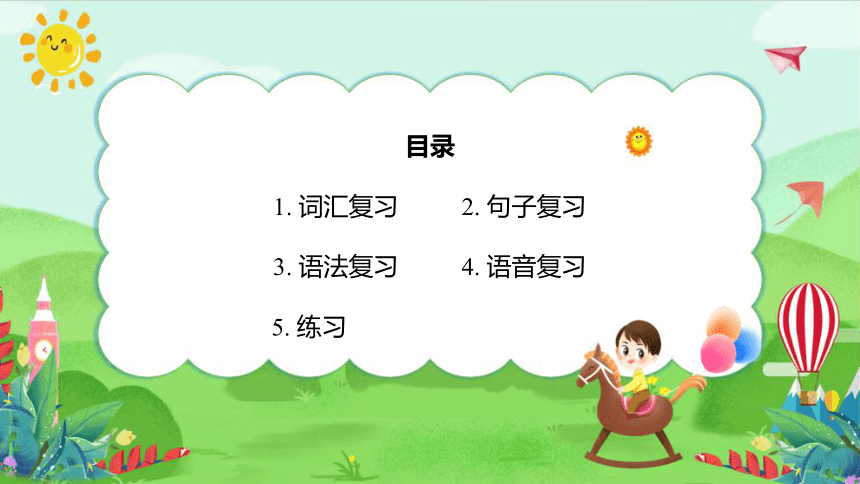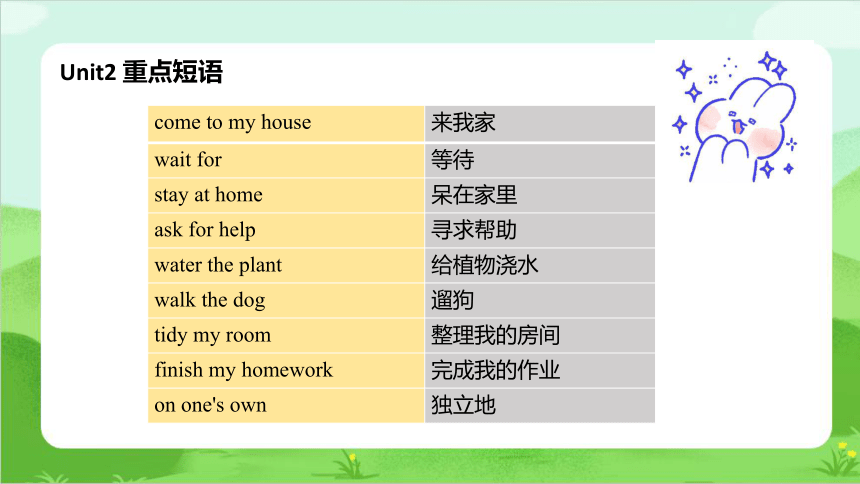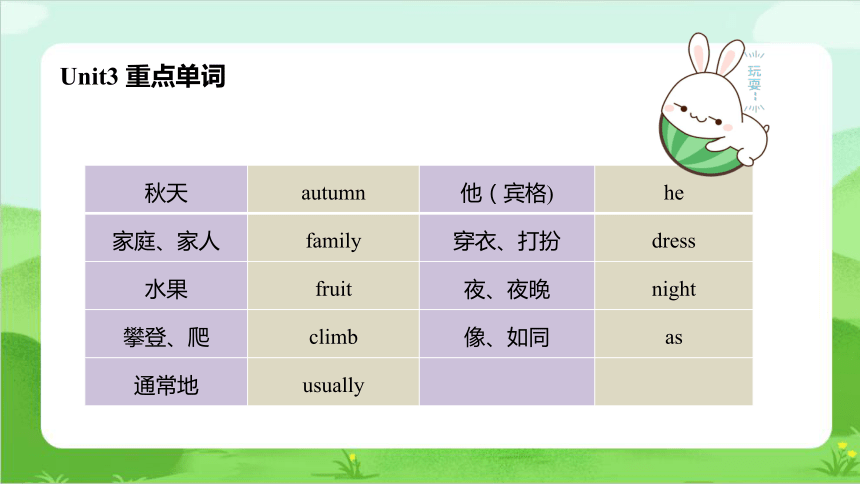Unit 4 Revision Lesson 13-Lesson 14 课件(共58张PPT)-五年级英语上学期(北京版)
文档属性
| 名称 | Unit 4 Revision Lesson 13-Lesson 14 课件(共58张PPT)-五年级英语上学期(北京版) |

|
|
| 格式 | pptx | ||
| 文件大小 | 11.4MB | ||
| 资源类型 | 试卷 | ||
| 版本资源 | 北京版 | ||
| 科目 | 英语 | ||
| 更新时间 | 2024-09-19 19:38:21 | ||
图片预览












文档简介
(共58张PPT)
Unit 4 Revision
Review 1-3
北京版·五年级上册
1. 掌握Unit1—Unit3的重点单词、词组、句型
2. 掌握字母以及字母组合的发音
3. 掌握形容词比较级和最高级的用法
4. 掌握情态动词的用法
学习目标
目录
1. 词汇复习 2. 句子复习
3. 语法复习 4. 语音复习
5. 练习
Vocabulary
Unit1 重点单词
超市 supermarket 课程、学科 subject
肉 meat 画画 draw
果汁 juice 艺术 art
付款、交款 pay 数学 maths
绵羊 sheep 英语 English
熊 bear 科学 science
放、标上 put 分钟 minute
困难的 difficut
Unit1 重点短语
do best in 做的最好 throw beanbags 丢沙包
keep birds 养鸟 wait a minute 等一下
grow flowers 养花、种花 put one's name on 写上某人的名字
skip rope 跳绳 Unit1 重点句型
询问比较喜欢哪一个 Which do you like better
询问最喜欢什么课程 Which class do you like best?
回答比较喜欢哪一个或者最喜欢什么 I like ... better/best.
like的用法(doing\sth.) I like reading/English.
表达在某方面做的最好 I do best in... ...
Unit2 重点单词
房子、住宅 house 一半、半小时 half
应该、必须 must 晚、迟了 late
兄弟 brother 脏的 dirty
传递 pass 要求 ask
完成 finish 参加 jion
家庭作业 homework 洗、洗涤 wash
Unit2 重点短语
come to my house 来我家
wait for 等待
stay at home 呆在家里
ask for help 寻求帮助
water the plant 给植物浇水
walk the dog 遛狗
tidy my room 整理我的房间
finish my homework 完成我的作业
on one's own 独立地
Unit2 重点句型
邀请、征求别人意见用语 Would you like( to do)/sth.
邀请、征求别人意见用语并进行回答 Can/May I use/copy your...
Sure,here you are/Sorry,but you can't.
我们可以今天下午打扫它们吗? Shall we clean them this afternoon
我必须呆在家里。 I must stay at home.
Unit3 重点单词
秋天 autumn 他(宾格) he
家庭、家人 family 穿衣、打扮 dress
水果 fruit 夜、夜晚 night
攀登、爬 climb 像、如同 as
通常地 usually
Unit3 重点短语
on the Mid-Autumn Festival 在中秋节
in the Chinese calender 在中国日历中
tell sb. more about 告诉某人更多关于... ...
the Double Ninth Festival 重阳节
the Latern Festival 元宵节
the Dragon Boat Festival 端午节
climb mountains 爬山
visit my grantparents 拜访我的外祖父母
dress up 乔装打扮
knock on doors 窍门
Unit3 重点句型
能不能告诉我更多关于... ... Can you tell me more about... ...
询问某个节日在什么时候 When is the Mid-Autumn Festival day
回答某个节日在几月几日 It's on the 15th day of the 8th month in the Chinese calender.
听起来像是为老年人的一个假期。 It sounds like a holiday for the old people.
Grammar
形容词的比较级和最高级
一、用法
当两种物体之间相互比较时,我们要用比较级, “更……”;
当相互比较的物体是三个或三个以上时,我们要用最高级,
“最…… ”
二、比较级和最高级的变化规则:
1.一般在原级后直接加-er或-est
tall—taller—tallest fast—faster—fastest
2. 以-e结尾的单音节形容词直接加-r或-st
large—larger—largest nice—nicer—nicest
形容词的比较级和最高级
3. 以-y结尾的形容词,改-y为-i再加-er或-est
busy—busier—busiest
4. 在重读闭音节中,要先双写这个辅音字母,再加er或est
hot —hotter—hottest big—bigger—biggest
三、不规则形容词比较级和最高级
good — better — best many — more — most
beautiful — more beautiful — most beautiful
情态动词
一、情态动词的定义与特点
定义:情态动词表示说话人的情感、态度、语气。
特点:一般没有人称和数的变化;后边跟动词原形;否定形式直接在情态动词后加not。
主要有:can (could), may (might), must, shall (should), will(would)等。
情态动词
二、情态动词的用法
1. can/could
(1)表示能力,“能,会”。(could为过去式)
e.g. He can swim. 他会游泳。
(2)表示允许,“可以”。口语中常代替may。
(could 不表时态,表示更委婉的语气)
e.g. Can I sit here 我可以坐这儿吗?
Could you tell me more about it
你可以讲得更详细一些吗?
情态动词
二、情态动词的用法
2. may
表示允许,“可以”。否定回答时可用can’t或mustn’t, 表示“不可以,禁止”。
e.g. ——May I ask you a question
我可以问您一个问题吗?
——Yes, you can. (No, you can’t/mustn’t.)
是的,你可以。(不,你不可以。)
情态动词
二、情态动词的用法
3. must
表示“必须、必要” 。
mustn’t 意为“不许,禁止”。
e.g. All passengers must wear seat belts.
所有乘客都必须系安全带。
情态动词
二、情态动词的用法
4. would
用于征询意见或者有礼貌的请求。
e.g. Would you like some juice
你想要一些果汁吗?
Would you like to join us
你想要加入我们吗?
情态动词
二、情态动词的用法
5. shall
用于第一人称,征求对方的意见。
e.g. Shall we dance tonight 我们今晚跳舞吗?
6. should
表示“应该、劝告、建议”。
e.g. You should clean your room.
你应该打扫一下你的房间。
Pronunciation
j [d ] jacket jeans, jeep,
jam, jungle, jar,
joy journey, job,
join, enjoy, subject
k [k]: key, kitchen king,
kid, kite, basket,
blanket, like, make,
take, drink, milk, ask
l [l]: little, lamb, leave, eleven, holiday,
lady, lake, July, help, police,
old, play, gold, hill, girl,
April, model
Lesson 13
Do you understand?
Can you talk ?
I like singing better. I sing a lot of songs.
drawing pictures
reading books
Can you write
Chinese
English
maths
drawing
fish
moon cakes
room
easy
useful
interesting
sweet
yummy
clean
bright
I like maths because maths is useful.I like ... because... ________________________________________________________________________________________________
Can you do
Can you do
The noise of firecrackers sends away the old year,
The spring breeze brings warmth into cottages,
The bright rosy sun glows over thousands of houses,
New peach wood charms replace the old ones for good luck.
Can you read and write
The noise of firecrackers sends away the old year,
The spring breeze brings warmth into cottages,
The bright rosy sun glows over thousands of houses,
New peach wood charms replace the old ones for good luck.
Can you read and write
元日
宋 王安石
爆竹声中一岁除, 春风送暖入屠苏。
千门万户瞳瞳日, 总把新桃换旧符。
Can you read and write
As a lonely stranger in a strange land,
At every holiday my homesickness increases.
Far away, I know my brothers have reached the peak,
They are planting flowers, but one is not present.
九月九日忆山东兄弟
[唐] 王维
独在异乡为异客,每逢佳节倍思亲。
遥知兄弟登高处,遍插茱萸少一人。
Task 1
Can you say which holiday each poem is about Match it with the festival.
Poem 1
Poem 2
Can you read and write
the Mid-Autumn Festival
the Dragon Boat Festival
the Double Ninth Festival
the Spring Festival
Tomb-sweeping Day
Task 2
Can you read and write
Some poems have rhymes. Can you pair the following lines
Lesson 14
Listen and number
Can you talk
National Day
国庆节
我们穿上最好的衣服。
Can you write
Can you do
Can you read and write
Good and Bad Foods
A well-known saying goes "You are what you eat". It really means that if you eat good foods, you will be healthy. If you eat bad foods, like potato chips, you certainly will not be healthy and fit. Which foods are good for you
the basics for healthy living
Can you read and write
Good and Bad Foods
You should start with fresh foods. Vegetables will do you good, and so will fruits and grains (谷 物). You should eat morecarrots, broccoli (西兰花)celery (芹菜), and other healthy fresh foods.
Can you read and write
Good and Bad Foods
Bad foods will not make you sick, but you should not eat too much. Too many cakes, soft drinks, salty foods, and fatty foods will do you harm.
Can you read and write
Task 1
Read and choose. More than one of these answers are correct.
1. What are the best foods for you
A. Vegetables. B. Grains.C. Candies. D. Burgers.
2. Which of the following is bad for you
A. Vegetables. B. Fresh fruits. C. Coke.D. Hamburgers.
3. Which of these are good for you
A. Apples. B. Pears. C. Sweet potatoes.
D. Broccoli. E. Fatty foods. F. Salty foods.
Can you read and write
Task 2
What do you usually have for breakfast, lunch, and dinner
In the morning, I usually have _________ for breakfast. I have lunch at school. We have different kinds of food on different days. Sometimes we have _________, and sometimes we have ___________. My favourite dish is_________. Every day when I get home, my mum makes me a nice dinner. We usually have __________.
Practice
用单词正确形式填空
1. I don't like eating_______ (potato), but I like eating potato chips.
2. I like _________(throw) beanbags.
3. Would you like to grow _________ (flower)
4. Which season do you like_______ (well), spring or winter
5. Shall we go ___________(swim)
找出不同类的单词。
( )1. A. chicken B. meat C. orange juice
( )2. A. English B. singing C. art
( )3. A. dirty B. broken C. Water
( )4. A. eighth B. five C. ninth
( )5. A. the Lantern Festival B. jiaozi C. zongzi
单项选择。
( ) 1. —_______ is the Dragon Boat Festival
—It’s on the fifth day of the fifth month in the Chinese calendar.
A. When B. What C. Where
单项选择。
( ) 2. We also call _______ Yuanxiao Festival.
A. the Dragon Boat Festival
B. the Lantern Festival
C. the Mid-Autumn Festival
单项选择
( ) 3. Children usually ______ at night and knock on doors for candies.
A. have a party B. dress up C. eat turkey
( ) 4. —When is the Double Ninth Festival
—It’s on ______________ in the Chinese calendar.
A. the ninth day of the first month
B. the fifteenth day of the ninth month
C. the ninth day of the ninth month
单项选择
( ) 5. —Can you tell me more about _________
—Yes. The whole family gets together. We eat moon cakes.
A. the Mid-autumn Festival B. Halloween
C. the Lantern Festival
选词填空。
1. We _______ moon cakes yuebing.
2. It’s on the fifteenth day of the eighth month in the Chinese _________.
3. We enjoy dressing _____ as superheroes or aliens.
4. Halloween is ______ October 31st.
5. Old people ________ mountains with their families.
climb on call calendar up
选择正确的答句
( ) 1. What can you do ( ) 2. What can Sarah do ( ) 3. Can you draw cartoons ( ) 4. Can you wash the clothes ( ) 5. What’s your favourite food
A. She can water the flowers.
B. Fish.
C. No, I can’t.
D. Yes, I can.
E. I can wash the clothes.
Unit 4 Revision
Review 1-3
北京版·五年级上册
1. 掌握Unit1—Unit3的重点单词、词组、句型
2. 掌握字母以及字母组合的发音
3. 掌握形容词比较级和最高级的用法
4. 掌握情态动词的用法
学习目标
目录
1. 词汇复习 2. 句子复习
3. 语法复习 4. 语音复习
5. 练习
Vocabulary
Unit1 重点单词
超市 supermarket 课程、学科 subject
肉 meat 画画 draw
果汁 juice 艺术 art
付款、交款 pay 数学 maths
绵羊 sheep 英语 English
熊 bear 科学 science
放、标上 put 分钟 minute
困难的 difficut
Unit1 重点短语
do best in 做的最好 throw beanbags 丢沙包
keep birds 养鸟 wait a minute 等一下
grow flowers 养花、种花 put one's name on 写上某人的名字
skip rope 跳绳 Unit1 重点句型
询问比较喜欢哪一个 Which do you like better
询问最喜欢什么课程 Which class do you like best?
回答比较喜欢哪一个或者最喜欢什么 I like ... better/best.
like的用法(doing\sth.) I like reading/English.
表达在某方面做的最好 I do best in... ...
Unit2 重点单词
房子、住宅 house 一半、半小时 half
应该、必须 must 晚、迟了 late
兄弟 brother 脏的 dirty
传递 pass 要求 ask
完成 finish 参加 jion
家庭作业 homework 洗、洗涤 wash
Unit2 重点短语
come to my house 来我家
wait for 等待
stay at home 呆在家里
ask for help 寻求帮助
water the plant 给植物浇水
walk the dog 遛狗
tidy my room 整理我的房间
finish my homework 完成我的作业
on one's own 独立地
Unit2 重点句型
邀请、征求别人意见用语 Would you like( to do)/sth.
邀请、征求别人意见用语并进行回答 Can/May I use/copy your...
Sure,here you are/Sorry,but you can't.
我们可以今天下午打扫它们吗? Shall we clean them this afternoon
我必须呆在家里。 I must stay at home.
Unit3 重点单词
秋天 autumn 他(宾格) he
家庭、家人 family 穿衣、打扮 dress
水果 fruit 夜、夜晚 night
攀登、爬 climb 像、如同 as
通常地 usually
Unit3 重点短语
on the Mid-Autumn Festival 在中秋节
in the Chinese calender 在中国日历中
tell sb. more about 告诉某人更多关于... ...
the Double Ninth Festival 重阳节
the Latern Festival 元宵节
the Dragon Boat Festival 端午节
climb mountains 爬山
visit my grantparents 拜访我的外祖父母
dress up 乔装打扮
knock on doors 窍门
Unit3 重点句型
能不能告诉我更多关于... ... Can you tell me more about... ...
询问某个节日在什么时候 When is the Mid-Autumn Festival day
回答某个节日在几月几日 It's on the 15th day of the 8th month in the Chinese calender.
听起来像是为老年人的一个假期。 It sounds like a holiday for the old people.
Grammar
形容词的比较级和最高级
一、用法
当两种物体之间相互比较时,我们要用比较级, “更……”;
当相互比较的物体是三个或三个以上时,我们要用最高级,
“最…… ”
二、比较级和最高级的变化规则:
1.一般在原级后直接加-er或-est
tall—taller—tallest fast—faster—fastest
2. 以-e结尾的单音节形容词直接加-r或-st
large—larger—largest nice—nicer—nicest
形容词的比较级和最高级
3. 以-y结尾的形容词,改-y为-i再加-er或-est
busy—busier—busiest
4. 在重读闭音节中,要先双写这个辅音字母,再加er或est
hot —hotter—hottest big—bigger—biggest
三、不规则形容词比较级和最高级
good — better — best many — more — most
beautiful — more beautiful — most beautiful
情态动词
一、情态动词的定义与特点
定义:情态动词表示说话人的情感、态度、语气。
特点:一般没有人称和数的变化;后边跟动词原形;否定形式直接在情态动词后加not。
主要有:can (could), may (might), must, shall (should), will(would)等。
情态动词
二、情态动词的用法
1. can/could
(1)表示能力,“能,会”。(could为过去式)
e.g. He can swim. 他会游泳。
(2)表示允许,“可以”。口语中常代替may。
(could 不表时态,表示更委婉的语气)
e.g. Can I sit here 我可以坐这儿吗?
Could you tell me more about it
你可以讲得更详细一些吗?
情态动词
二、情态动词的用法
2. may
表示允许,“可以”。否定回答时可用can’t或mustn’t, 表示“不可以,禁止”。
e.g. ——May I ask you a question
我可以问您一个问题吗?
——Yes, you can. (No, you can’t/mustn’t.)
是的,你可以。(不,你不可以。)
情态动词
二、情态动词的用法
3. must
表示“必须、必要” 。
mustn’t 意为“不许,禁止”。
e.g. All passengers must wear seat belts.
所有乘客都必须系安全带。
情态动词
二、情态动词的用法
4. would
用于征询意见或者有礼貌的请求。
e.g. Would you like some juice
你想要一些果汁吗?
Would you like to join us
你想要加入我们吗?
情态动词
二、情态动词的用法
5. shall
用于第一人称,征求对方的意见。
e.g. Shall we dance tonight 我们今晚跳舞吗?
6. should
表示“应该、劝告、建议”。
e.g. You should clean your room.
你应该打扫一下你的房间。
Pronunciation
j [d ] jacket jeans, jeep,
jam, jungle, jar,
joy journey, job,
join, enjoy, subject
k [k]: key, kitchen king,
kid, kite, basket,
blanket, like, make,
take, drink, milk, ask
l [l]: little, lamb, leave, eleven, holiday,
lady, lake, July, help, police,
old, play, gold, hill, girl,
April, model
Lesson 13
Do you understand?
Can you talk ?
I like singing better. I sing a lot of songs.
drawing pictures
reading books
Can you write
Chinese
English
maths
drawing
fish
moon cakes
room
easy
useful
interesting
sweet
yummy
clean
bright
I like maths because maths is useful.I like ... because... ________________________________________________________________________________________________
Can you do
Can you do
The noise of firecrackers sends away the old year,
The spring breeze brings warmth into cottages,
The bright rosy sun glows over thousands of houses,
New peach wood charms replace the old ones for good luck.
Can you read and write
The noise of firecrackers sends away the old year,
The spring breeze brings warmth into cottages,
The bright rosy sun glows over thousands of houses,
New peach wood charms replace the old ones for good luck.
Can you read and write
元日
宋 王安石
爆竹声中一岁除, 春风送暖入屠苏。
千门万户瞳瞳日, 总把新桃换旧符。
Can you read and write
As a lonely stranger in a strange land,
At every holiday my homesickness increases.
Far away, I know my brothers have reached the peak,
They are planting flowers, but one is not present.
九月九日忆山东兄弟
[唐] 王维
独在异乡为异客,每逢佳节倍思亲。
遥知兄弟登高处,遍插茱萸少一人。
Task 1
Can you say which holiday each poem is about Match it with the festival.
Poem 1
Poem 2
Can you read and write
the Mid-Autumn Festival
the Dragon Boat Festival
the Double Ninth Festival
the Spring Festival
Tomb-sweeping Day
Task 2
Can you read and write
Some poems have rhymes. Can you pair the following lines
Lesson 14
Listen and number
Can you talk
National Day
国庆节
我们穿上最好的衣服。
Can you write
Can you do
Can you read and write
Good and Bad Foods
A well-known saying goes "You are what you eat". It really means that if you eat good foods, you will be healthy. If you eat bad foods, like potato chips, you certainly will not be healthy and fit. Which foods are good for you
the basics for healthy living
Can you read and write
Good and Bad Foods
You should start with fresh foods. Vegetables will do you good, and so will fruits and grains (谷 物). You should eat morecarrots, broccoli (西兰花)celery (芹菜), and other healthy fresh foods.
Can you read and write
Good and Bad Foods
Bad foods will not make you sick, but you should not eat too much. Too many cakes, soft drinks, salty foods, and fatty foods will do you harm.
Can you read and write
Task 1
Read and choose. More than one of these answers are correct.
1. What are the best foods for you
A. Vegetables. B. Grains.C. Candies. D. Burgers.
2. Which of the following is bad for you
A. Vegetables. B. Fresh fruits. C. Coke.D. Hamburgers.
3. Which of these are good for you
A. Apples. B. Pears. C. Sweet potatoes.
D. Broccoli. E. Fatty foods. F. Salty foods.
Can you read and write
Task 2
What do you usually have for breakfast, lunch, and dinner
In the morning, I usually have _________ for breakfast. I have lunch at school. We have different kinds of food on different days. Sometimes we have _________, and sometimes we have ___________. My favourite dish is_________. Every day when I get home, my mum makes me a nice dinner. We usually have __________.
Practice
用单词正确形式填空
1. I don't like eating_______ (potato), but I like eating potato chips.
2. I like _________(throw) beanbags.
3. Would you like to grow _________ (flower)
4. Which season do you like_______ (well), spring or winter
5. Shall we go ___________(swim)
找出不同类的单词。
( )1. A. chicken B. meat C. orange juice
( )2. A. English B. singing C. art
( )3. A. dirty B. broken C. Water
( )4. A. eighth B. five C. ninth
( )5. A. the Lantern Festival B. jiaozi C. zongzi
单项选择。
( ) 1. —_______ is the Dragon Boat Festival
—It’s on the fifth day of the fifth month in the Chinese calendar.
A. When B. What C. Where
单项选择。
( ) 2. We also call _______ Yuanxiao Festival.
A. the Dragon Boat Festival
B. the Lantern Festival
C. the Mid-Autumn Festival
单项选择
( ) 3. Children usually ______ at night and knock on doors for candies.
A. have a party B. dress up C. eat turkey
( ) 4. —When is the Double Ninth Festival
—It’s on ______________ in the Chinese calendar.
A. the ninth day of the first month
B. the fifteenth day of the ninth month
C. the ninth day of the ninth month
单项选择
( ) 5. —Can you tell me more about _________
—Yes. The whole family gets together. We eat moon cakes.
A. the Mid-autumn Festival B. Halloween
C. the Lantern Festival
选词填空。
1. We _______ moon cakes yuebing.
2. It’s on the fifteenth day of the eighth month in the Chinese _________.
3. We enjoy dressing _____ as superheroes or aliens.
4. Halloween is ______ October 31st.
5. Old people ________ mountains with their families.
climb on call calendar up
选择正确的答句
( ) 1. What can you do ( ) 2. What can Sarah do ( ) 3. Can you draw cartoons ( ) 4. Can you wash the clothes ( ) 5. What’s your favourite food
A. She can water the flowers.
B. Fish.
C. No, I can’t.
D. Yes, I can.
E. I can wash the clothes.
同课章节目录
- Unit 1 Why are you so happy?
- Lesson 1
- Lesson 2
- Lesson 3
- Lesson 4
- Unit 2 May I speak to Mike?
- Lesson 5
- Lesson 6
- Lesson 7
- Lesson 8
- Unit 3 Will you do me a favour?
- Lesson 9
- Lesson 10
- Lesson 11
- Lesson 12
- Unit 4 Revision
- Lesson 13
- Lesson 14
- Unit 5 Which kind would you like?
- Lesson 15
- Lesson 16
- Lesson 17
- Lesson 18
- Unit 6 May I take your order?
- Lesson 19
- Lesson 20
- Lesson 21
- Lesson 22
- Unit 7 What is nature?
- Lesson 23
- Lesson 24
- Lesson 25
- Lesson 26
- Unit 8 Revision
- Lesson 27
- Lesson 28
